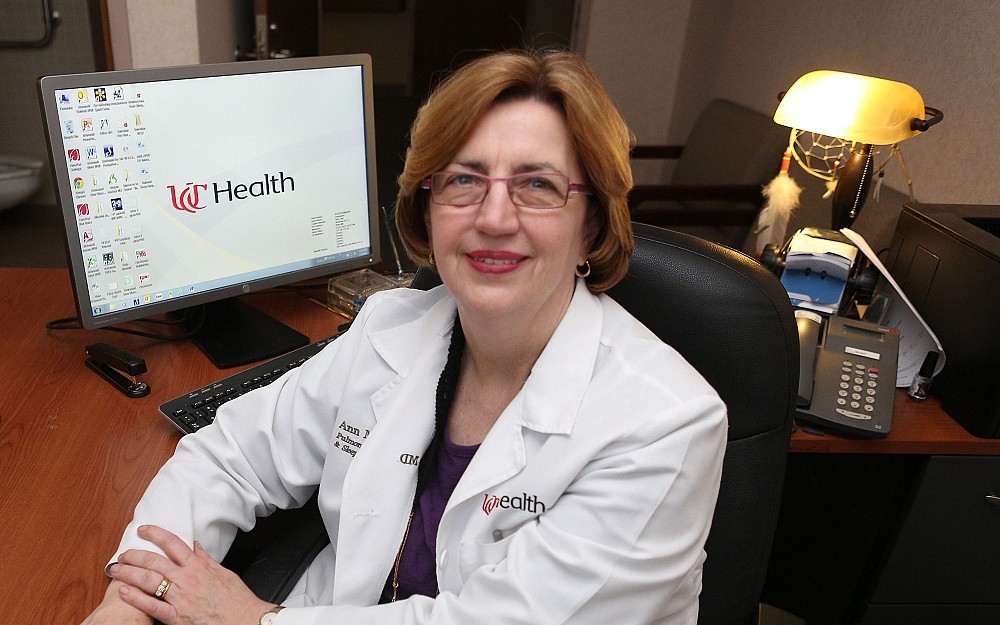
HEALTH LINE: Getting Enough Sleep Really Isn't Optional
CINCINNATIThe typical adult needs 7 to 7 1/2 hours of sleep each night, while for teenagers and young adults under 25 about 9 to 10 hours of sleep per night is recommended, says Ann Romaker, MD, director of the University of Cincinnati Medical Center Sleep Medicine Center.
Sleep deprivation can lead to problems with memory, heart disease, diabetes and stroke. About 40 million Americans each year suffer from chronic, long-term sleep disorders and an additional 20 million experience occasional sleeping problems, according to the National Institute of Neurological Disorders and Stroke.
"There are sleep-related genes in every tissue of the body, genes that turn on only during sleep and genes that turn on only when you are awake, says Romaker, an associate professor in the Division of Pulmonary, Critical Care and Sleep Medicine at the University of Cincinnati College of Medicine. "The genes in the heart and lung that turn on during sleep are genes that are needed for repair. The genes that turn on during the day have more to do with power and endurance. If you dont get enough sleep your heart and lungs dont repair like they are supposed to.
Romaker cited a 2008 study at the University of Chicago which found that one extra hour of sleep per night (from 6 to 7 hours nightly) appears to decrease the risk of coronary artery calcification, an early marker for cardiovascular disease. The benefit of the additional hour of sleep was comparable to gains from lowering blood systolic blood pressure by 17 mm Hg, according to the University of Chicago.
The research focused on 495 participants, primarily healthy middle-aged individuals, who were part of the Coronary Artery Risk Development in Young Adults study begun in 1985.
The University of Chicago reported that about 12 percent of those in the study first developed coronary artery calcification over five years of follow-up. In about 27 percent of participants who slept less than 5 hours per night calcified arteries were found, according to the university. For individuals who slept 5 to 7 hours nightly only 11 percent of participants were affected with calcified arteries. The number of participants with calcified arteries fell to 6 percent for those who slept more than 7 hours per night, the University of Chicago reported.
"Thats a big deal, says Romaker. "Its important to make time for sleep. Its really not optional.
Sleep also affects memory and different stages of sleep are required for different types of memory, says Romaker. "Many studies have shown that students who dont get enough sleep, their performance on tests is significantly worse. Memory is much better if you study and then sleep versus if you stay up all night. Your performance on a test is significantly improved.
Researchers at Havard University have also found that sleep deprivation is linked to diabetes, weight gain and hypertension.
To pave the way for better sleep, the National Sleep Foundation offers the following simple tips:
Stick to a sleep schedule, even on weekends.
Practice a relaxing bedtime ritual.
Exercise daily.
Evaluate your bedroom to ensure ideal temperature, sound and light.
Sleep on a comfortable mattress and pillow.
Beware of hidden sleep stealers such as alcohol and caffeine.
Turn off electronic devices before bed.
The National Sleep Foundation is hosting National Sleep Awareness Week, March 2-8, 2015an annual event that coincides with the beginning of daylight saving time. The foundation conducts the 2015 Sleep in America Poll, which is now available at http://sleepfoundation.org/sleep-polls-data/2015-sleep-and-pain.
For more information about the University of Cincinnati Medical Center Sleep Medicine Center, visit http://uchealth.com/services/sleep-medicine/ or call 513-475-7500.
Related Stories
President Pinto announces interim provost
April 8, 2025
UC President Neville Pinto announced that Dr. John Weidner, dean of the College of Engineering and Applied Science, will step in as interim provost following Dr. Kristi Nelson's departure on June 1.
ChemoID test leads to better outcomes in platinum-resistant...
April 7, 2025
MSN and MSN UK highlighted results from a new Phase 3 trial published in the journal npj Precision Oncology that found a cancer stem cell test can accurately choose more effective treatments and lead to improved outcomes for patients with platinum-resistant ovarian cancer.
OTR mural celebrates UC alumni success
April 4, 2025
The UC Alumni Association, UCAA, will mark its annual Alumni Celebration during its upcoming Alumni Week, April 7-13, with a community art project commemorating this year’s slate of alumni honorees receiving the organization’s top awards.
